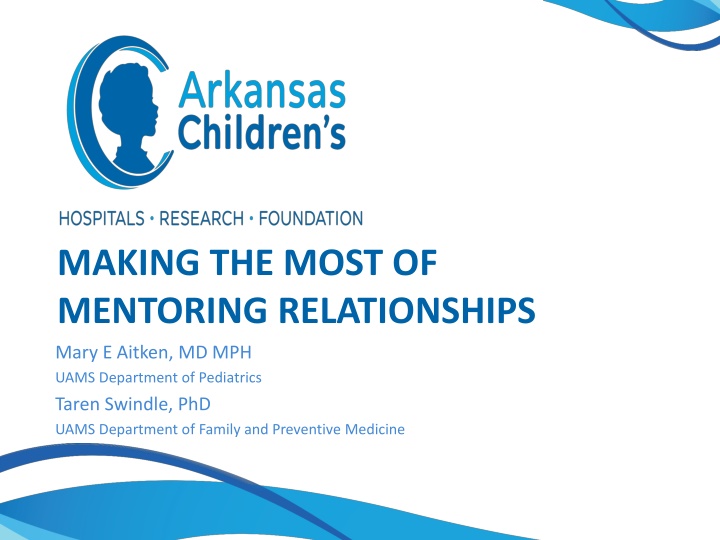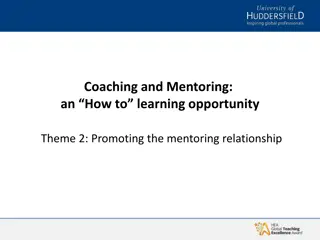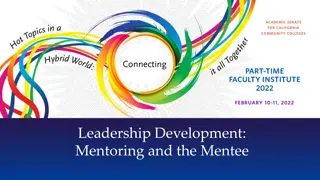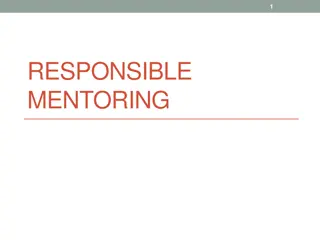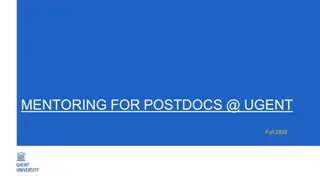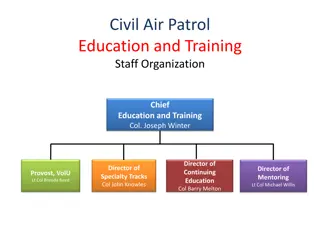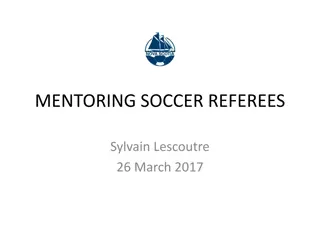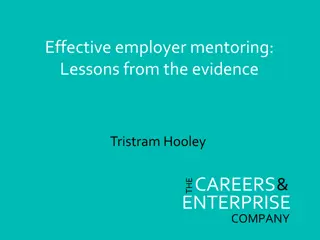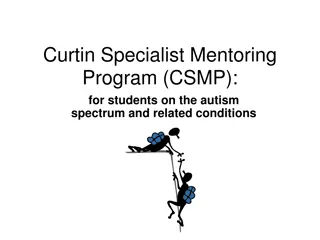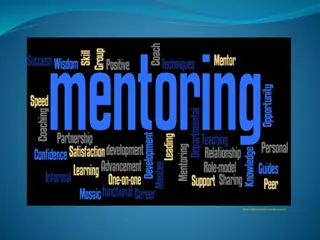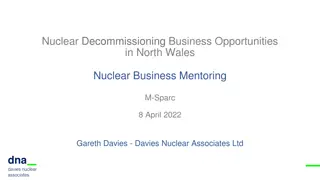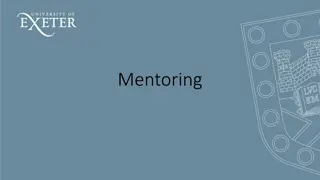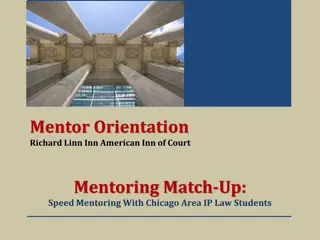Maximizing Mentoring Relationships for Success
The evolution of mentoring, mentor training programs, outcomes, phases of mentor/mentee relationships, and key roles and strategies for effective mentoring in various fields of study.
Download Presentation

Please find below an Image/Link to download the presentation.
The content on the website is provided AS IS for your information and personal use only. It may not be sold, licensed, or shared on other websites without obtaining consent from the author.If you encounter any issues during the download, it is possible that the publisher has removed the file from their server.
You are allowed to download the files provided on this website for personal or commercial use, subject to the condition that they are used lawfully. All files are the property of their respective owners.
The content on the website is provided AS IS for your information and personal use only. It may not be sold, licensed, or shared on other websites without obtaining consent from the author.
E N D
Presentation Transcript
MAKING THE MOST OF MENTORING RELATIONSHIPS Mary E Aitken, MD MPH UAMS Department of Pediatrics Taren Swindle, PhD UAMS Department of Family and Preventive Medicine
Background on Mentoring Long history of on the job mentoring Pygmalion model of single mentor no longer feasible or effective to meet mentee needs Newer models include goals of improving: Communication skills Professional skills to increase likelihood of success such as grant writing, management, teaching Increasing diversity in science
Mentor Training Entering Mentoring curricula developed and tested in Wisconsin Disseminated through National Research Mentoring Network Focus on mentors developing skills to engage in more productive mentor/mentee relationships Mentor training for different research environments, topics, populations
Mentor Training Outcomes Randomized controlled trial of mentor/mentee pairs from 16 institutions Training results: Significantly higher skills across 6 competencies addressed in the training Changes in mentoring behavior after training (97% vs 53% of controls) Significantly higher observed changes by mentees (44% saw 2 or more positive changes) 90% would recommend training PfundC, et al. Training mentors of clinical and translationalresearch scholars: a randomized controlled trial. Acad Med. 2014;89(5):774-782.
Phases of Mentor/Mentee Relationship Selection Individual Development Plans Assessing fit Building a mentoring team Alignment Common roles and expectations Mentoring compacts Cultivation Fostering independence Effective communication strategies Assessing the mentoring relationship Closure Preparing for the end from the beginning Strategies for transitioning
Phases of Mentor/Mentee Relationship Selection Mentor Roles Understand your motivation to be a mentor Ensure you have the time and resources to be a mentor Have a realistic assessment of your skills and leadership experience; consider team mentoring Commit to training to be a more effective mentor https://mentoringresources.ictr.wisc.edu/sites/defau lt/files/AssessingFitChecklist.pdf
Phases of Mentor/Mentee Relationship Selection Mentee Roles Have a clear understanding of your motivation to be mentored Select a mentor based on pre-established criteria relevant to your career goals Broaden your search for multiple mentors to include faculty outside your department Take the initiative
Individual Development Plans Roadmap for your career Examples: https://mentoringresources.ictr.wisc.edu/MentorIDPTemplates https://tri.uams.edu/wp- content/uploads/sites/80/2017/10/IDP-Questionnaire-2017.pdf https://tri.uams.edu/wp- content/uploads/sites/80/2017/10/KL2-IDP-Goals-Table.pdf
Phases of Mentor/Mentee Relationship Alignment Mentor Roles Listen carefully to mentee s goals Assess areas of strength and growth Clarify resources (physical, financial, personal) Understand and convey institutional expectations and norms (written and unwritten) Communicate personal expectations (verbally and in writing) Be flexible Dedicate time to mentorship role (within reason) https://mentoringresources.ictr.wisc.edu/ExampleMentorin gCompacts
Phases of Mentor/Mentee Relationship Alignment Mentee Roles Have a clear understanding of your goals and the role/resources you want your mentor to play/provide Be prepared to clearly communicate your expectations and listen to the expectations of your mentor(s) Be flexible and willing to alter your expectations and change plans Inform your mentor of your preferred learning style
Setting Expectations: Mentor Perspective Balance required between mentee stage, environment, and resources Opportunities to set goals and avoid potential conflicts Publications Shared laboratory or other resources Timelines (for products, independence, support) Competing responsibilities
Setting Expectations: Mentee Perspective Role clarity of mentoring team Communication preferences Meeting parameters ASK - How can you make their job easier? Timeline and format for feedback.
Phases of Mentor/Mentee Relationship Cultivation Mentor Roles Advise on what you know; refer to others when you don t Provide relevant examples and resources Give constructive feedback Don't shy away from difficult conversations Respond to changing needs of your mentee Celebrate successes Revisit IDPs, mentor plans, and expectations regularly Periodically evaluate progress and assess the relationship https://mentoringresources.ictr.wisc.edu/EvalTemplate s
Phases of Mentor/Mentee Relationship Cultivation Mentee Roles Actively listen and contribute to conversations Acknowledge your weaknesses and build from your strengths Accept and reflect on constructive criticism Don't get defensive in difficult conversations Follow through on tasks and meet deadlines Communicate your changing needs Periodically evaluate progress and assess the relationship
Phases of Mentor/Mentee Relationship Closure Mentor Roles Be sensitive to when the relationship has run its course Set goal for a change on good terms, whatever the reason (mission accomplished, lack of progress, moves, shift in professional focus, etc.) Follow up on your mentee s successes Provide a summative evaluation of the experience Say thank you and give credit where credit is due Learn from your experience when mentoring others https://mentoringresources.ictr.wisc.edu/MenteeClosu reResources
Phases of Mentor/Mentee Relationship Closure Mentee Roles Provide your mentor with updates after the formal relationship has ended Provide a summative evaluation of the experience Say thank you and give credit where credit is due Give back to the profession and mentor others
Resources for Mentor Training TRI-sponsored mentor training Online training: https://www.ctsi.umn.edu/education-and- training/mentoring/mentor-training Curated readings and tools for mentors: https://nrmnet.net/research-mentor-training/
For Discussion What have you found that works for managing multiple mentees/mentors? What s one thing you have learned in a mentoring relationship that you wish you knew from the beginning?
